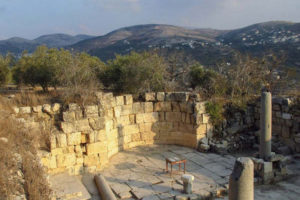- Created: February 8, 2019 10:14 am
- Updated: August 28, 2020 11:12 am
Categories:
The village takes its name from Sebaste, the city founded in 25 BC by Herod the Great on the site of the ancient Samaria. Here, against a stunning backdrop of rolling hills and valleys, visitors can explore the sprawling ruins of the elaborate Herod’s Temple built for Augustus, as well as ruins of a Roman stadium, theater, and colonnaded forum. The site also includes ruins of a Byzantine church located on a site associated with the discovery of Saint John the Baptist’s head. The Mosque of the Prophet Yahia (John in Arabic) also marks Sabastiya’s connection to the religious figure. Originally a Byzantine church, the structure was rebuilt by the Crusaders in the twelfth century and then transformed into a mosque.
The village takes its name from Sebaste, the city founded in 25 BC by Herod the Great on the site of the ancient Samaria. Here, against a stunning backdrop of rolling hills and valleys, visitors can explore the sprawling ruins of the elaborate Herod’s Temple built for Augustus, as well as ruins of a Roman stadium, theater, and colonnaded forum. The site also includes ruins of a Byzantine church located on a site associated with the discovery of Saint John the Baptist’s head. The Mosque of the Prophet Yahia (John in Arabic) also marks Sabastiya’s connection to the religious figure. Originally a Byzantine church, the structure was rebuilt by the Crusaders in the twelfth century and then transformed into a mosque.

